The Hindu Editorial (Not taking sides) – Mar 04, 2022
With a convincing majority of 141 of 193 countries, the UN General Assembly voted on Wednesday for a resolution that deplored in the… For further reading, visit “The Hindu”. Below is today’s word list-1 for The Hindu Editorial (Not taking sides) – Mar 04, 2022.
To read this article, click “The Hindu”.
This preview is provided here with permission.
Courtesy: The Hindu
The Hindu Editorial (Not taking sides) – Mar 04, 2022:
- take sides (phrase) – support, back, give one’s support to, be on the side of, stand by, stand up for, ally oneself with, associate oneself with.
- conflict (noun) – war, armed conflict, battle, fighting.
- engage (verb) – involve (in a diplomatic talk/discussion).
- deeply (adverb) – intensely, strongly, powerfully, profoundly, keenly.
- deepen (verb) – intensify, escalate; exacerbate, aggravate, worsen, become worse.
- convincing (adjective) – decisive, conclusive, impressive, emphatic, resounding.
- UN General Assembly (UNGA) (noun) – (The UN General Assembly (UNGA) is the main policy-making organ of the Organization. Comprising all Member States, it provides a unique forum for multilateral discussion of the full spectrum of international issues covered by the Charter of the United Nations. Each of the 193 Member States of the United Nations has an equal vote.
- resolution (noun) – a formal decision taken at a meeting with the help of a vote; motion, proposal.
- UN resolution (noun) – United Nations resolution is formal expression of the opinion or will of United Nations organs. It is a decision or declaration voted on by all member states of the United Nations and it usually requires a simple majority (50 percent of all votes plus one) to pass. Although any UN body can issue resolutions, in practice most resolutions are issued by the Security Council or the General Assembly.
- UN resolution 8979 (noun) – The 8979th meeting of the United Nations Security Council (UNSC) was held on February 25 to pass a resolution under Chapter VII of the UN charter. The draft resolution was called to vote to end Russia’s military offensive against Ukraine. It also aimed to deplore Russia’s decision to grant independence to Ukraine’s breakaway regions Donetsk and Luhansk and reverse the decision, calling it violative of territorial integrity and political independence of Ukraine.
- deplore (verb) – complain about, lament, be against; regret, express regret about.
- terms (noun) – language, mode of expression; conditions, restrictions; particulars, details, points.
- withdrawal (noun) – retreat, disengagement, pull out.
- troop (noun) – soldiers, armed forces.
- session (noun) – meeting, discussion, forum.
- rubric (noun) – a set of rules; a set of guidelines; a set of instructions.
- “Uniting for Peace” resolution or UNGA resolution 377 (V) A (1950) (noun) – United Nations General Assembly resolution 377(V) is known as the Uniting for peace resolution. Adopted in 1950, the resolution resolves that if the Security Council, because of lack of unanimity of the permanent members, fails to exercise its primary responsibility to act as required to maintain international peace and security…, the General Assembly shall consider the matter immediately with the view to making recommendations to Members…in order to restore international peace and security. If not in session, the General Assembly may meet using the mechanism of the emergency special session.
- invoke (verb) – cite, refer to, adduce, resort to.
- decade (noun) – a period of ten years.
- as a result of (phrase) – due to, because of, on the back of.
- aborted (adjective) – failed, flopped, terminated.
- UN Security Council (UNSC) (noun) – it is one of the six principal organs of the United Nations, charged with ensuring international peace and security.
- veto (verb) – reject a decision/proposal/resolution.
- teeth (noun) – genuine power.
- stand (noun) – stance, point of view, viewpoint, opinion, standpoint, position, perspective, approach.
- commons (noun) – the common people (considered as a part of the political system); resources belonging to the entire community.
- sign up (phrasal verb) – commit, engage in, agree (formally).
- sponsor (noun) – backer, supporter.
- driver (noun) – (motivating/deciding) force/factor.
- seem (verb) – look, appear.
- isolate (verb) – separate, set apart, alienate, distance.
- motion (noun) – proposal, resolution.
- abstain (verb) – not vote, decline to vote, refuse to vote (for or against something (a resolution/proposal/motion).
- decry (verb) – criticize, denounce, condemn.
- recognise (verb) – acknowledge, accept, admit (a statehood formally).
- Donbas region (noun) – a historical, cultural, and economic region in south-eastern Ukraine, some of whose territory (Donetsk and Luhansk) is occupied by two separatist groups in the course of the Russo-Ukrainian War. President Vladimir V. Putin of Russia has recognized the independence of these two separatist regions in Ukraine.
- make clear (phrase) – explain, elucidate, clarify, spell out.
- relentless (adjective) – constant, continuous, non-stop, unceasing.
- turn a blind eye to (phrase) – overlook, disregard, neglect, ignore, pay no attention to.
- abstention (noun) – refusal to vote, abstaining, non-voting.
- lobby (verb) – to influence (the government/its official group/elected legislators) to create the actions, policies, or decisions to help a particular organization.
- shift (noun) – change, reversal.
- procedural (adjective) – formal, systematic, methodical.
- UN Human Rights Council (UNHRC) (noun) – The Human Rights Council is an inter-governmental body within the United Nations system responsible for strengthening the promotion and protection of human rights around the globe and for addressing situations of human rights violations and make recommendations on them. The Council is created on 15 March 2006 and it is made up of 47 United Nations Member States which are elected by the UN General Assembly. The Human Rights Council replaced the former United Nations Commission on Human Rights.
- International Atomic Energy Agency (IAEA) (noun) – an international organization that seeks to promote the peaceful use of nuclear energy, and to inhibit its use for any military purpose, including nuclear weapons. The IAEA was established as an autonomous organization on 29 July 1957.
- explanation of vote (EOV) and explanation of position (EOP) (noun) – When a test/resolution is adopted by the General Assembly or the Security Council, Member States have the opportunity to explain their national position and the reasons for their vote before (explanation of position) or after (explanation of vote) it. These statements have primarily political purposes and may be intended to recall an essential element of the negotiation or something that the Member State considers poorly reflected in the compromise text/resolution.
- call for (phrasal verb) – require, publicly ask/necessitate, demand.
- dialogue (noun) – discussion, talks, parleying, deliberation.
- officials (noun) – representatives; functionaries, officers.
- room (noun) – scope, chance, leeway, freedom, latitude, opportunity (for something to happen).
- play a role (phrase) – contribute to, be instrumental in, be a factor in.
- diplomacy (noun) – international politics, foreign affairs, foreign policy; negotiations, discussions, talks, dialogue (related to international politics).
- discomfort (noun) – embarrassment, discomfiture, unease, uneasiness.
- drop (verb) – exclude, discard, throw out, leave out, reject.
- reference (noun) – mention, remark, comment.
- legitimate (adjective) – legal, lawful, permissible, allowable, admissible.
- interests (noun) – common concerns (in politics/business).
- language (noun) – expressions, parlance, way of talking, mode of expression, choice of words,.
- territorial (adjective) – relating to a particular territory (area/region).
- sovereignty (noun) – autonomy, independence, freedom, self-government, self-rule.
- humanitarian (adjective) – compassionate, humane socially concerned, welfare.
- humanitarian assistance/humanitarian aid (noun) – it is intended to “save lives, alleviate suffering and maintain human dignity during and after man-made crises and disasters caused by natural hazards, as well as to prevent and strengthen preparedness for when such situations occur. It is given to meet the immediate needs of victims of disasters or violence. It can include food, money, medical supplies, and other things required by those affected; compensation.
- aid (noun) – help, support, assistance.
- strategic (adjective) – relating to achieving long-term or overall goals.
- stand by (phrasal verb) – be loyal to, stand up for, support, give one’s support to, be supportive of, back, come to the defence of, take the side of, side with.
- disapproval (noun) – criticism, censure, condemnation, denunciation; dissatisfaction.
- abstentionist (adjective) – relating to a person who practises or supports abstention/non-voting
- call something into question (phrase) – doubt, distrust, mistrust, suspect, lack confidence in, have doubts about, be suspicious of, feel uneasy about.
- on good terms (phrase) – in a good relationship, having good relations.
- evacuate (verb) – ask people to leave, empty, move out of, get out of, exit from (from a dangerous place).
- given (preposition) – considering, taking into account, bearing in mind.
- aspiration (noun) – ambition, hope, desire, urge, wish.
- oft (adverb) – old form of often; frequently, many times, time and again, repeatedly.
- motto (noun) – slogan, catchphrase.
- Vasudhaiva Kutumbakam (phrase) – it is a Sanskrit phrase that means “the world is one family”.
- concern (noun) – problem, worry.
Note:
1. Click each one of the words above for their definition, more synonyms, pronunciation, example sentences, phrases, derivatives, origin and etc from http://www.oxforddictionaries.com/.
2. Definitions (elementary level) & Synonyms provided for the words above are my personal work and not that of Oxford University Press. Tentative definitions/meanings are provided for study purpose only and they may vary in a different context.
3. This word list is for personal use only. Reproduction in any format and/or Commercial use of it is/are strictly prohibited.
The Hindu Editorial (Not taking sides) – Mar 04, 2022:
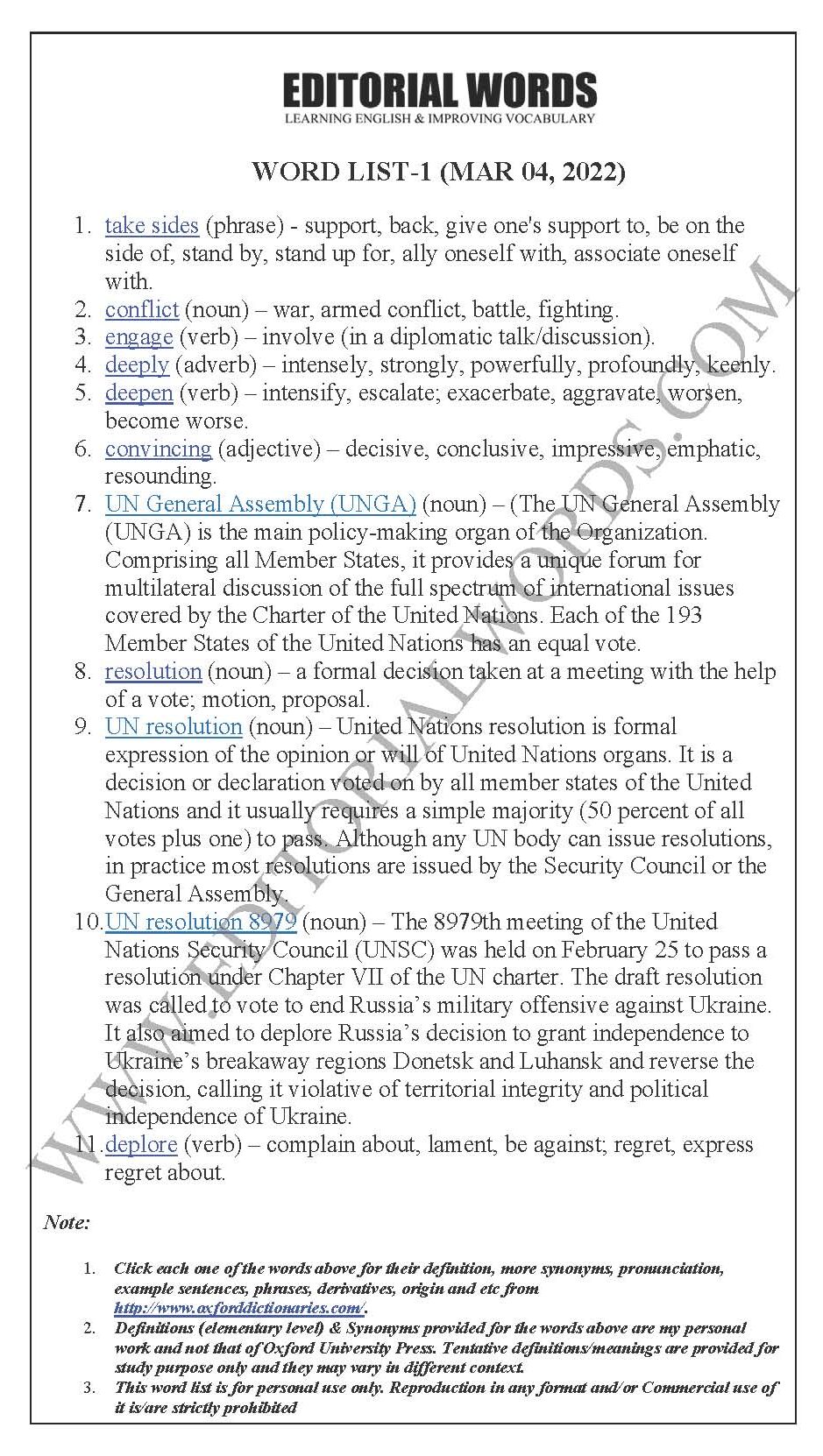
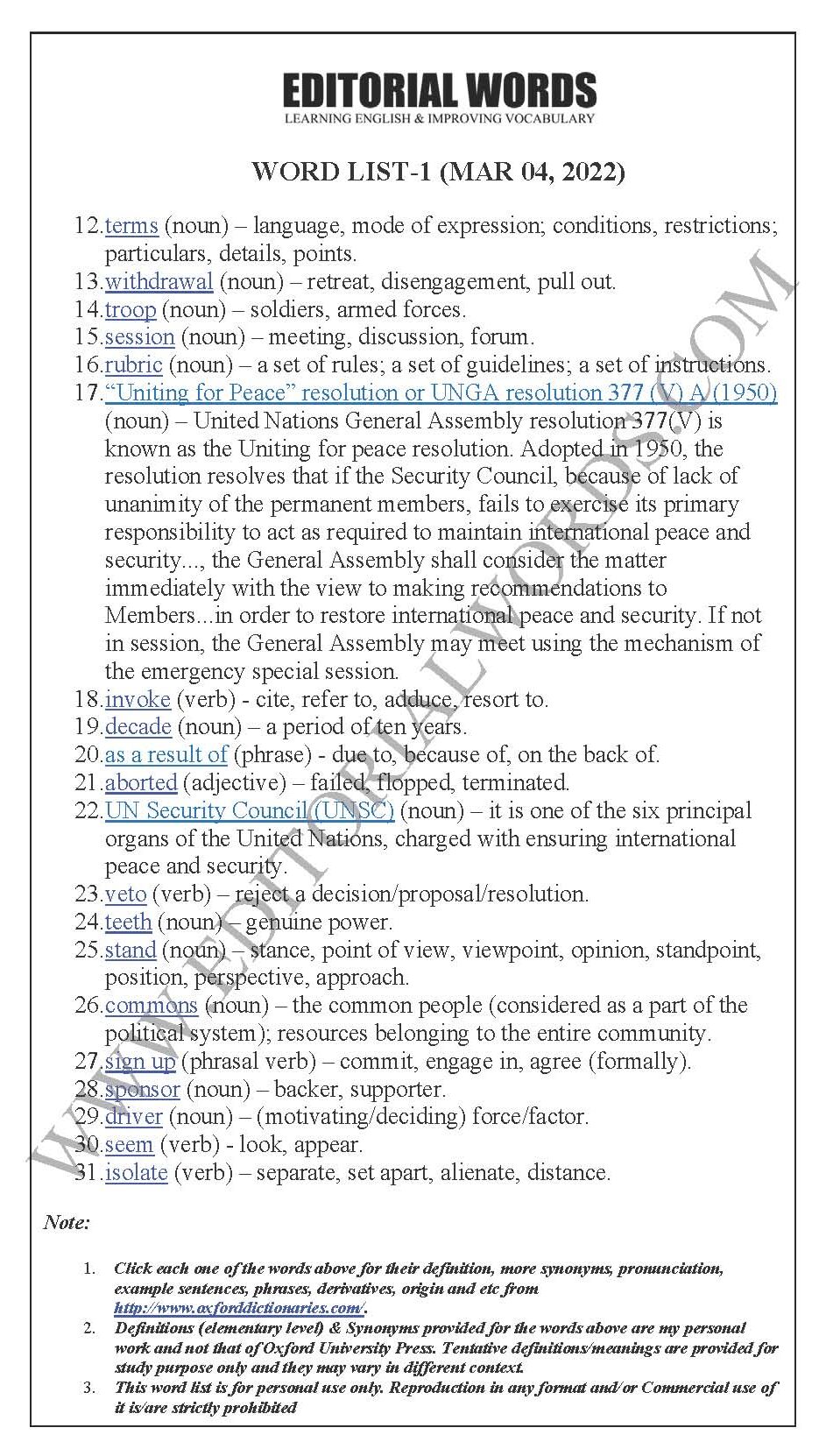
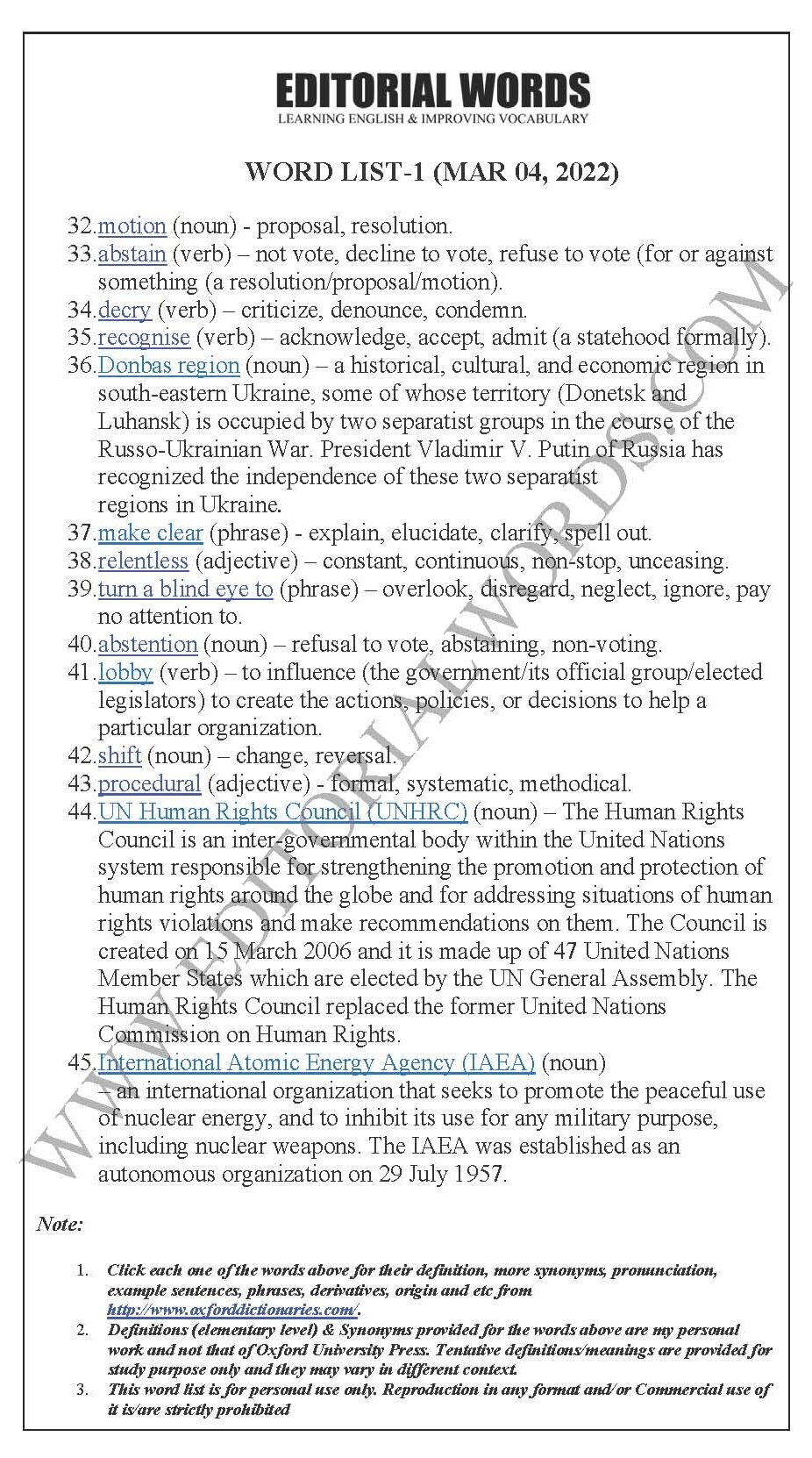
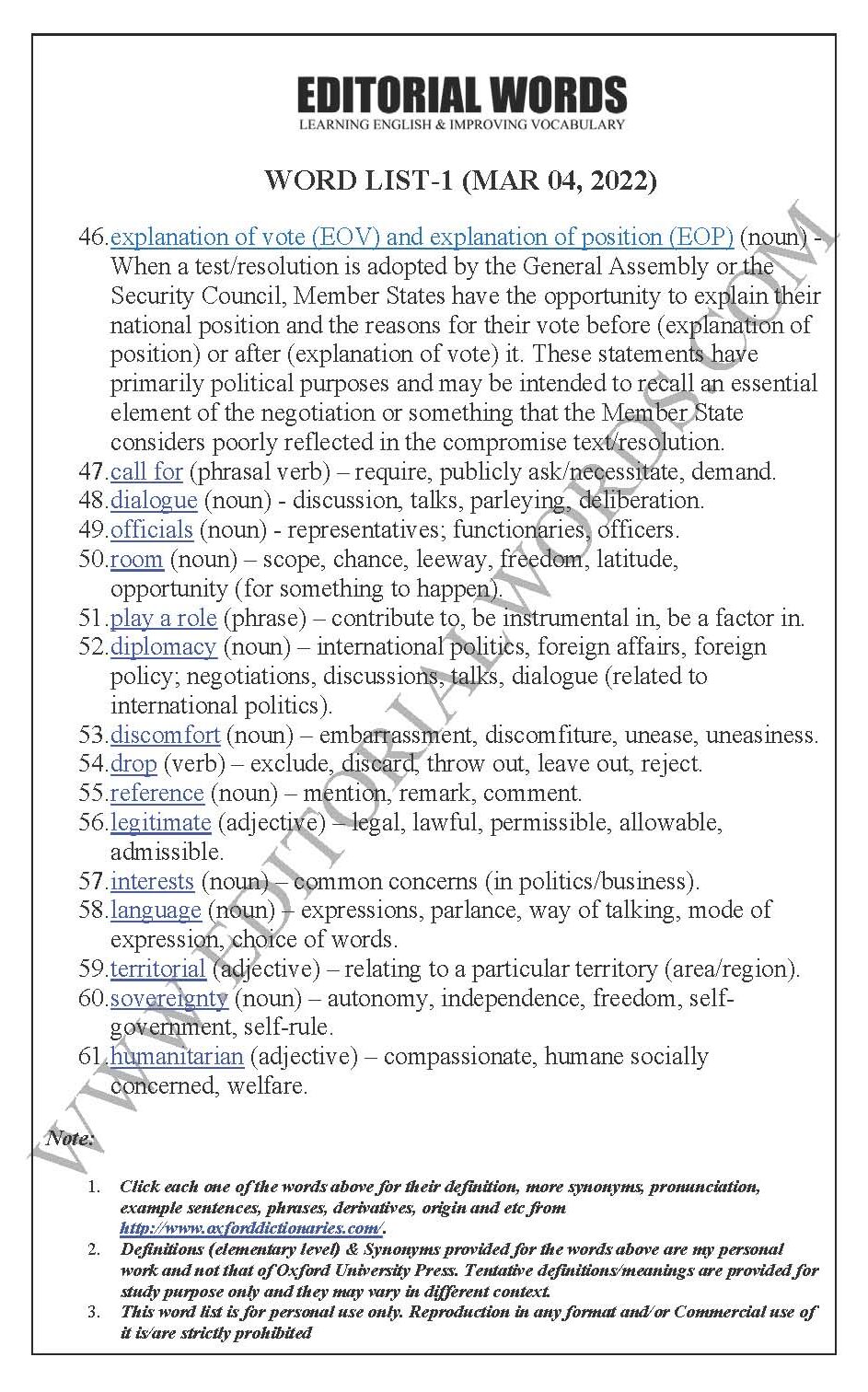
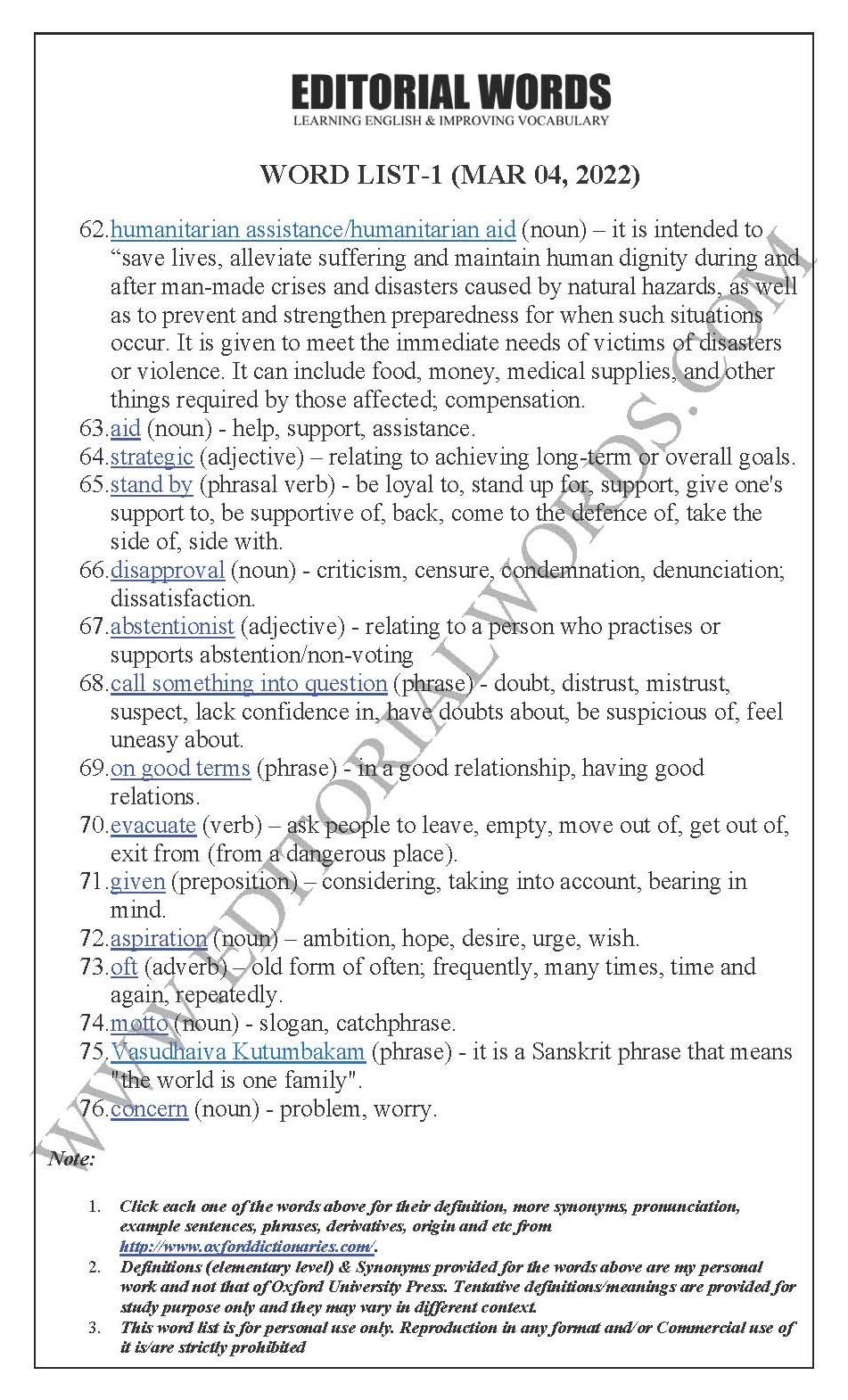
“Phrasal Verbs” We Learnt Last Week
“Idioms & Phrases” We Learnt Last Week
“Important Definitions” We Learnt Last Week
Recent Word Lists For The Hindu Editorial Articles

Be the first to comment